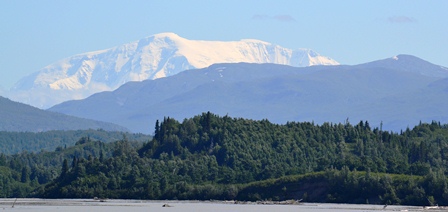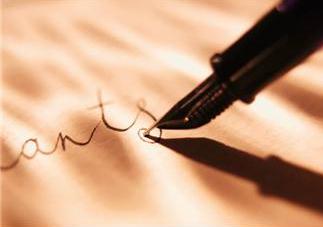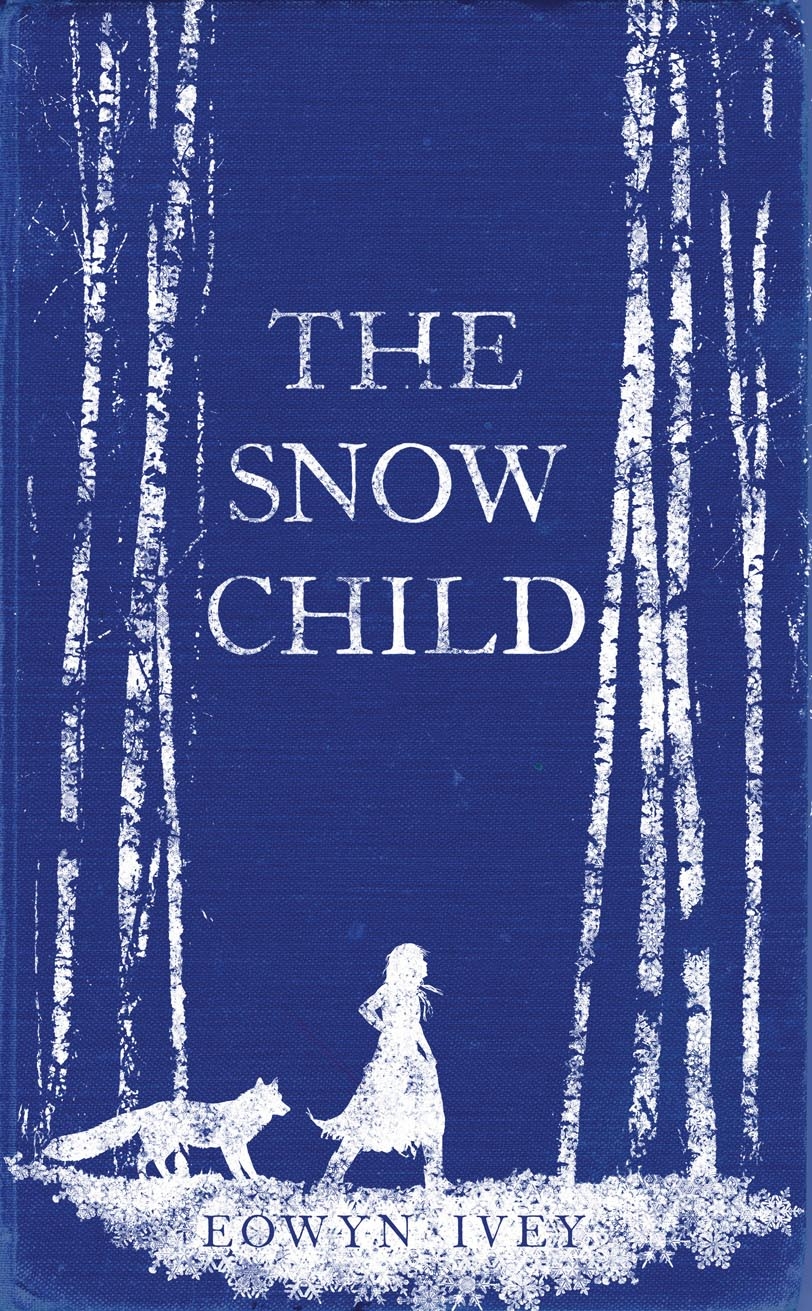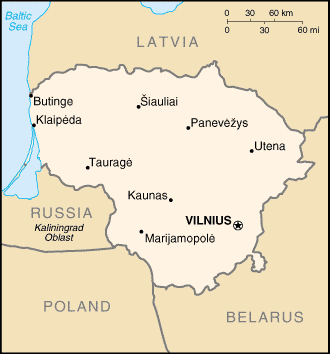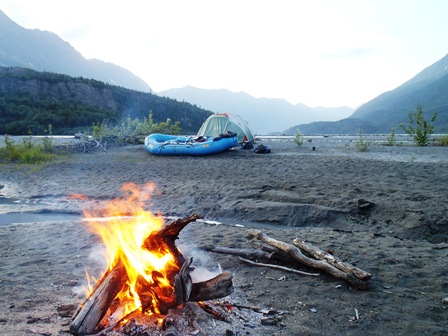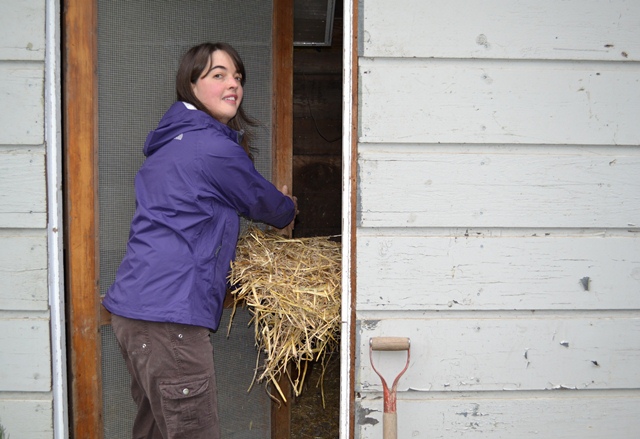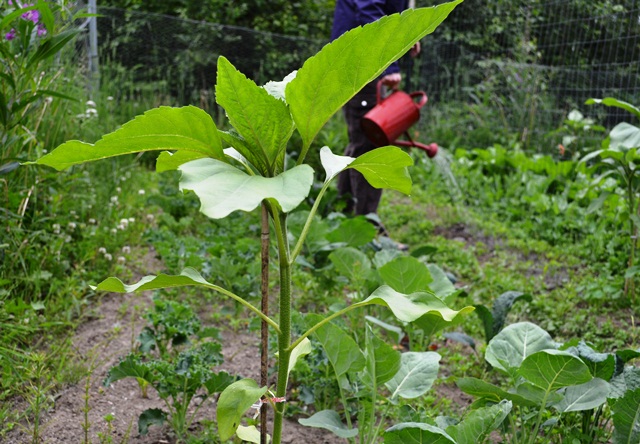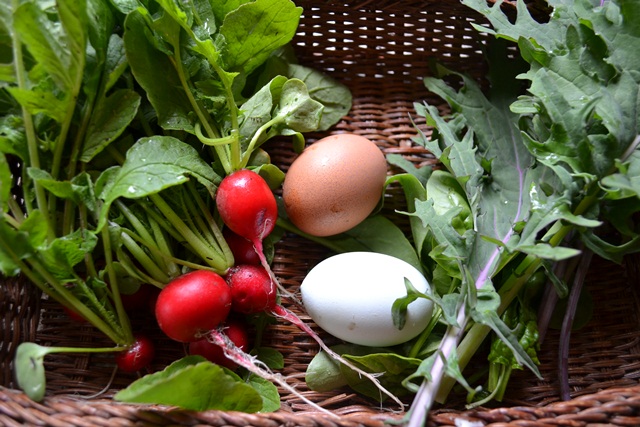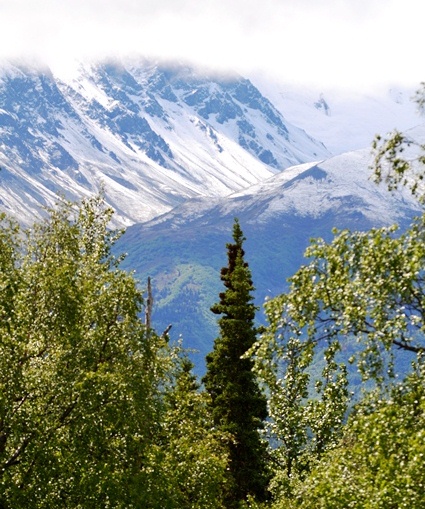Seeing Alaska with fresh eyes
There is no place I’d rather be during the summer than Alaska. If family and friends want to see us, they’ll just have to come north.
And come they have. We currently have nine relatives from my husband’s side of the family staying with us, including five cousins for my two daughters to play with. Some of them, like my father- and brother-in-law, lived here for many years before heading south to Florida and North Carolina. For my 16-year-old and 9-year-old nephews, however, this is their very first visit to Alaska.
No matter where we live, many of us find that when visitors arrive, we discover all the local places and activities we ignore because they’re just down the road, too close for notice. I’ve walked on glaciers I never paid any attention to, gone to musk ox and reindeer farms I had never stopped by, and driven to parks I never gave any thought to, all because we had relatives in town.
But this time, my house guests have reawakened my senses to some of Alaska’s most basic elements.
“The air,” said my 16-year-old nephew. When he first arrived, his mother (who grew up here) said to him on Facebook, “Just smell that air …”
Air? It doesn’t get more basic than that, but as I stood on my back porch and breathed in deeply, I thought I could almost smell what they do — a cleanness, a hint of birch boughs and spruce trees and mountain rock and snow melt, dry, clean, good air. If air could sparkle, this air would.
It got me thinking. So I asked my 9-year-old nephew what he liked about Alaska so far.
“It’s cold, and there are mountains everywhere.”
Cold? We’d had a regular heat wave, highs close to 75 degrees that day. But compared to Florida’s near 100-degree temperatures, I suppose it does feel colder. And at night it drops to the 50s or lower, and all the time there is a kind of crispness beneath the warmth, the glaciers and mountaintop snow fields always blowing a cool breeze against your skin.
Then I asked my mother-in-law what she notices when she visits.
“The silence. It’s so quiet, especially when you’re out on the river.”
So I listened, and I heard the silence. We can go hours at our house without hearing a single vehicle or airplane. Sometimes the silence has unnerved our visitors. They have trouble sleeping when it is so quiet. But Pam said she found it restful and serene, and I agreed.
As we talked, though, we started talking about bigger things, like culture and attitude. She said she appreciates the way people feel like they can be themselves up here, they can dress the way they want to dress, and don’t seem to be as consumed with technology and materialism.
Then my father-in-law offered his view, which is unique, too. Jim grew up in Florida, then raised a family here in Alaska for 30 or so years, and then moved back to Florida. His visits north are a kind of homecoming. When he first came, he came for the wilderness, he said. And then he grew to love the people. With Alaska’s small population, a person can feel immediately a part of things. But now, these years later, he says once again it’s the wild that draws him.
So now as I drive along the highway, I am noticing all of this — the quiet, the gray-blue mountains, the crisp air, the great swaths of wilderness and the sense that I could step out of my vehicle and immediately be swallowed by that wilderness.
Once again I am grateful to be here, at home, in Alaska.
Cheers!
Eowyn
Warning: May contain bear hot dogs
Dear fearless reader,
I grew up hearing a story about a relative, a great-great aunt, who in rural Colorado shooed a black bear off her porch with her broom. I’ve always loved the story. I can picture her in a long skirt and a determined look on her face. In some ways, she’s always been a hero of mine.
I love black bear meat. One of my earliest memories if of eating barbecued meat from a black bear my dad shot. Then you add in the fact that over the years I have bungled a few hunting moments that would have allowed me to bring home a black bear. I’ve been keeping an eye out for another opportunity.
Long story short — this doesn’t end well for one black bear.
We live in a semi-rural area of Alaska. Moose, wolves, coyotes, fox, ermine. We’re used to wild animals passing through, and we enjoy finding their tracks and watching their comings and goings. Occasionally,we have an opportunity to fill our freezer. Our first fall living in this house, my husband shot an enormous bull moose in our driveway.
But somehow several summers ago when I woke to the sound of bumps and thumps early in the morning, I expected something tamer. My husband was out in a field camp for his work as a biologist, so I left my two daughters sleeping and, still wearing my nightgown, went downstairs to investigate. A feral cat had been traveling the neighborhood. I opened the front door and prepared to yell “scat.”
Instead, a good-sized black bear scrambled off the porch, just feet away from me.
Needless to say, I shut the door.
“It’s a bear,” I shouted up to my daughters. I was prepared to go to the window, to watch, but then I remembered. It was open season for black bears. I ran upstairs and grabbed my 30-06 rifle and began searching for ammunition. Out of a decorative tin on our dresser, I scraped together four bullets.
“Where is he?” I asked my oldest daughter.
Last I had seen, the bear was headed up the hill and into the trees. It seemed unlikely I would get a shot at him.
“He’s by the rocks,” my daughter said.
Rocks? As I loaded the rifle, I tried to picture where on the hill there were rocks.
“Where?”
“Right there.”
The bear had returned and was standing by the rocks in our front yard. Wishing I had a box of ammunition instead of just four bullets, I stepped barefoot out our back door and peered around the corner of the house. My daughter watched out the window.
As I stood at the corner of the house in my nightgown, the black bear turned sideways to me and I took my shot.
This is the amazing neighborhood we live in: just down the road, Craig and Jenny are the kind of people who will drop everything to lend a hand. And across the street, Donna and Karl have the same generous hearts. Oh, and did I mention Karl guides brown bear hunters for a living?
All of them showed up in my yard and helped with the girls and with field-dressing the bear. It is no easy task, skinning, gutting, and quartering a bear. I have assisted with many moose and caribou, but this was my first bear, and I was grateful for the help.
We took much of the meat to a local butcher and had it made into fabulous hot dogs, which we roasted over campfires and ate in buns, or diced up in spaghetti, or sliced and fried with eggs. We also saved a few roasts and packages of stew meat as well. It was all delicious and wonderful.
Last summer I was driving around in our pickup truck with a stray dog, trying to find its owner, when I met one of our lake-side neighbors for the first time. We talked for a bit, and then his eyes got wide and he said, “Wait. You’re the lady who shot the black bear.” And he held out his hand to shake mine.
I admit it. I was kind of proud. I was keeping a family legend alive.
Cheers!
Eowyn
Letters from me to you
Thank you all to who participated in my poll. And thanks for the kind comments from Julie, Melissa, and Lola.
I thought the poll was kind of fun, and interesting. In many ways, the votes aligned with what I expected. However, the fact that nobody voted for the tales of a bookseller almost makes me want to share a few stories from Fireside Books just so you know how interesting it can be. (You would be amused, touched, and amazed at what we find in the boxes of used books people bring in.)
Outside of this streak of rebelliousness, though, the feedback will help me a lot in guiding how I divvy up my letter topics. The overwhelming winner was “life and adventures in Alaska,” which is wonderful because I love writing about Alaska. It really is an amazing place to live.
The next preferred topics were the writing life, The Snow Child, and one vote for “books I’m reading.” Strangely enough, I think the percentages equate pretty well with how much time and space I’ve devoted to these topics — mostly Alaska, some about my novels, and a mention here and there of books I’m reading.
In honor of “adventures in Alaska” being the top vote-getter, I had planned on at last telling you the story about the black bear on my porch. But yesterday we Alaskans got news of a horrible bear attack not far from where I live. Seven teenagers, here from New York, New Mexico and all over the country, were participating in an outdoor leadership school when they were attacked by a brown bear with a cub. Two of the youths suffered life-threatening injuries, and all were injured to some degree. The experience must have been incredibly traumatic to everyone involved, including the teachers and other students in the school.
It is a sober reminder to the hazards of the wilderness, and it didn’t feel right telling a different kind of bear story without first acknowledging this recent situation and sending out my wishes for a fast recovery for all involved.
On Wednesday, though, I’ll share my Alaskan bear tale.
Cheers!
Eowyn
Copper River to London to Vilnius
Dear worldly reader,
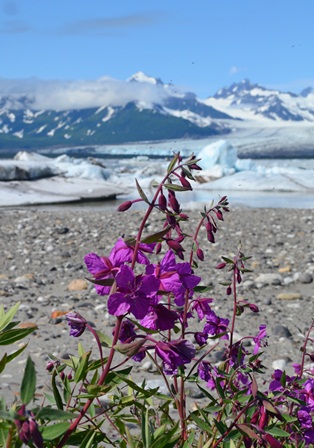
Fireweed blooms with Miles Glacier icebergs in the background. This was near our final camping site.
One of the side-effects of all this book excitement is that I have become an obsessive email checker. As much as I try, I cannot walk by my laptop without taking a quick peek.
To be honest, it was a relief to be out of internet/phone range while I floated the Copper River. As much as I enjoy the roller-coaster ride of publishing, there is a purity that comes with any time I spend in the wilderness. Life is reduced to necessity — food, clothing, shelter, safety. You don’t worry about Twitter or Facebook or online reviews. You worry about having enough clean water to drink and staying warm enough, finding a place to unroll your sleeping bag and not shooting a hole in the raft if you have to scare off a bear in the night.
But as soon as I returned to civilization, after I had hugged my family and taken a shower, well … I got online.
“See?” I told my husband with a touch of panic and excitement in my voice. “See? THIS is why I have to check my email.”
One of the first emails I came across was from my UK editor. She was sending my first glimpse of their beautiful cover for my book.
Then the roller coaster nose dived. There was an email from the publisher of Little, Brown. My fabulous editor, Andrea Walker, had announced that she would be leaving to become senior fiction editor at Penguin Press. This is the editor who acquired my book, who worked with me the past year to prepare it for publication, who had the vision for the cover. We had come to enjoy each other both as colleagues and friends. I was sad, but also excited for her. And, ultimately, I was calmed by the knowledge that my book continues to be in the hands of the amazing Reagan Arthur and everyone else at Little, Brown & Co.
Then, scanning through the inbox, my eye caught on a chain of messages titled “Lithuania.” The emails were between my agent and Tracy, who handles foreign rights at Little, Brown.
“Lithuania? Lithuania!”
Yep. While I was floating down the river, the UK settled on a cover, my editor announced her departure, and The Snow Child sold to Metodika, a publisher in Vilnius, the capital of Lithuania.
“See,” I said to Sam, just in case he hadn’t heard the first few times. “I’m telling you. That’s why I have to check my email ALL the time.”
Cheers!
Eowyn
Floating through a powerful world
Dear persevering reader,
When my husband Sam and I set out on the Copper River last week in a 14-foot raft, I knew we would travel through wild, beautiful places. It was an opportunity for me to get to know a landscape that I have been walking through in my imagination for months. What I didn’t yet comprehend was the powerful nature of this river.
Earlier this year, I was awarded a grant from the Rasmuson Foundation to enable me to float the river to research my next novel. We went armed with a camera, a write-in-the-rain journal, field identification books, maps, freeze-dried food, the report of an 1885 expedition up this same river, chest waders, rain gear, and a rifle for bear protection.
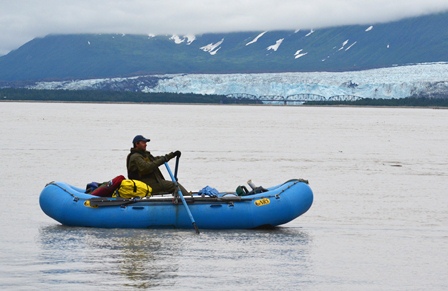 We launched the raft with the help of a friend near Chitina, Alaska, and spent the next week floating to Cordova, toward the ocean. Every second, the Copper discharges more than 400,000 gallons of icy, silty water. In that deep gray beneath our raft, thousands of sockeye salmon swam toward their spawning grounds.
We launched the raft with the help of a friend near Chitina, Alaska, and spent the next week floating to Cordova, toward the ocean. Every second, the Copper discharges more than 400,000 gallons of icy, silty water. In that deep gray beneath our raft, thousands of sockeye salmon swam toward their spawning grounds.
 About half-way through the 80-mile trip, seals began to appear. They would surface and bob near the raft, their eyes wide and watchful. Occasionally one would have a salmon in its mouth. One morning, they awoke us from our tent with their playful splashing in the river.
About half-way through the 80-mile trip, seals began to appear. They would surface and bob near the raft, their eyes wide and watchful. Occasionally one would have a salmon in its mouth. One morning, they awoke us from our tent with their playful splashing in the river.
Wherever we pulled out on the river bank, we saw sign of bears. Tracks in the sand, piles of scat, bloody salmon remains in the bushes. We tried to camp where there was the least amount of bear traffic, but it seemed inevitable that we would eventually see one. Not far from Haley Creek, there she was — a female brown bear with two cubs. She walked along the beach, stopping occasionally to eye us and wait for her cubs. I could have watched her all day from that safe distance, but the river swept us away.
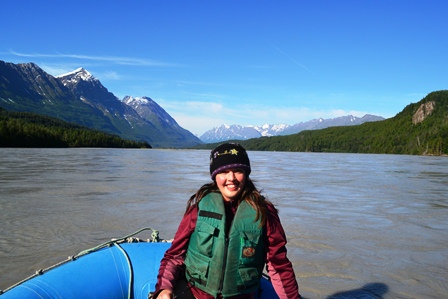 We encountered every kind of weather — sunshine that scorched our faces, winds that kicked up sand storms and white caps on the river, drizzly rain. Sam rowed us around giant, swirling eddies, through Abercrombie Rapids, and between house-sized icebergs from Miles Glacier. We floated through towering canyons, past waterfalls and sand
We encountered every kind of weather — sunshine that scorched our faces, winds that kicked up sand storms and white caps on the river, drizzly rain. Sam rowed us around giant, swirling eddies, through Abercrombie Rapids, and between house-sized icebergs from Miles Glacier. We floated through towering canyons, past waterfalls and sand 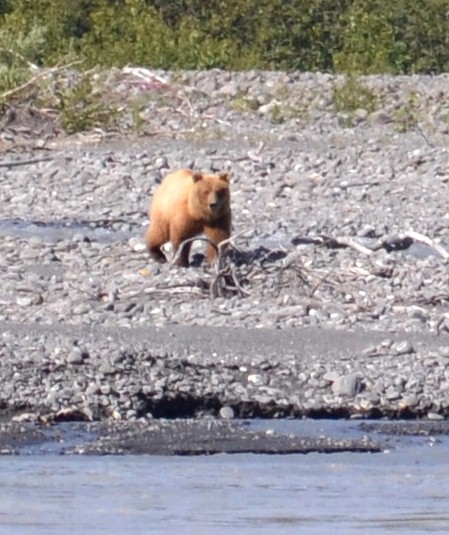 dunes, ancient glaciers, and the decaying remnants of a railroad that brought copper out of the mountains 100 years ago. In the distance, we heard glaciers calving and it sounded like canons being fired.
dunes, ancient glaciers, and the decaying remnants of a railroad that brought copper out of the mountains 100 years ago. In the distance, we heard glaciers calving and it sounded like canons being fired.
All the while I had the growing realization that this place was relentless, that no matter feats of engineering or little rubber rafts, this river was rushing, cold and silty, to the ocean just as it has for thousands of years.
At one point, Sam and I watched the wind obliterate paw prints across a sand bar.
“Tracks don’t last long around here,” he said.
Cheers!
Eowyn
Summer harvest
Dear diligent reader,
This is the time of year in Alaska when we begin to reap the rewards of our hard work. We’ve hauled the water from the creek, tilled and raked the garden, cleaned the chicken coop. We’ve weeded and planted and built fences.
Now, halfway through summer, we remember why.
Earlier this spring, when there was still snow outside, my 4-year-old daughter and I planted kale, broccoli and other seeds. For weeks they grew in front of the window. They were leggy, pale things. We transplanted them into the garden, and watered them and fed them with seaweed fertilizer. Now they are stout and dark green.
And with 20 hours of daylight and lush greenery to feed on, our hens are laying a half dozen eggs a day. The yolks are as bright as the sun.
The other morning, I went down to the garden and picked a handful of kale. Then I gathered the eggs. Back in the kitchen, I made the best omelet I can imagine ever eating. It was worth it all.
Cheers!
Eowyn
P.S. I’m taking a quick break next week, but I’ll be back the following — hopefully with some interesting stories to share.
Happy 4th of July
Just a short note today. We’re thawing a salmon fillet and picking rhubarb to get ready for the annual celebration at our friend’s farm. There will be bison burgers, grilled salmon, potato salad, pies, and a whole kitchen full of other delicious food. There will be several generations of friends — the grown-ups will talk about summer fishing trips and autumn hunting plans, the younger ones will jump on the trampoline or play on the swing set.
But the main purpose of the afternoon, besides celebrating Independence Day, is volleyball. This isn’t the beach game, or the indoor knee-pad version. This is farmer-regulation volleyball. We play it in a dusty field where the lines are marked by dragging a foot through the dirt. The rules are simple — get the ball to the other side of the net. Carrying? What’s that? As the evening progresses, you might even get away with a double-hit or helping your teammate’s serve clear the net. The older children who have watched this annual game for years will join in, learning the peculiar rules — don’t duck when the ball is coming at you. Instead, call “Yours” at the last minute and step aside so that your teammate has to dive into the dirt to save the play. If you have to take a break, offer to bring back drinks from the house for anyone who wants them.
We play for hours. Our muscles give out well before daylight fades because this time of year it never gets truly dark. We hate to let the night end. As we’ve all gotten older and taken on the responsibilities of adulthood, this is often the only volleyball game of the year. So we have to make it count.
Cheers!
Eowyn
Come on — dive in
Yesterday we got a call we had been waiting for. It was time to go jump in a lake.
The sun was shining. We had spent the day working hard: painting the house, installing our new plumbing system, stacking wood. When our friends who live on the shore of the neighborhood lake phoned to tell us that the water had warmed to a balmy 60 degrees, we grabbed our swim suits and headed to their dock.
Just six weeks ago, there was still ice on the lake. Swimming outdoors in Alaska requires a special kind of spirit — bold, adventuresome, some would say slightly nutty. Or at least susceptible to peer pressure.
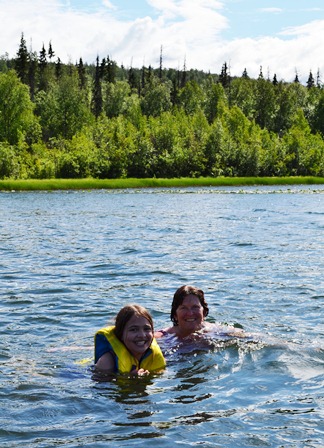
My daughter swimming yesterday with our friend Jenny Baer. Today it's raining, so we're glad we took our chance yesterday.
So … come on. We’re standing with our toes just off the edge of the dock. You’re hesitating, aren’t you? Do it. Jump in. It’ll feel great, I promise —
When you first plunge into the dark, cold water, there’s a brief moment when you think your heart might stop. Then you surface, gasp, screech, then sputter and laugh. You immediately scramble to the dock and climb out.
This is crazy! But when the cool mountain air hits your wet skin, you find yourself shivering. So now what? You want to retreat to the campfire or hot tub? Already? No, come on. Jump in one more time. It gets better, trust me.
The second time, the water doesn’t feel so cold. It’s actually kind of … lukewarm. You are floating on your back, the sun on your face. All you can see is blue sky and the tops of mountains and leafy trees. All you hear is the water lapping against your ears. Occasionally a lake weed tickles your foot. The air smells green, like lily pads and clean water and freshly mowed grass. You kick your feet and splash with your arms.
You have never felt so alive.
Cheers!
Eowyn
Adventure, & a novel, in the making
In 1955 the Rasmuson Foundation gave its first grant to an Alaskan — $155 for a film projector. Since then, the foundation has awarded more than $200 million to nonprofit organizations, libraries, schools, and individual artists.
This year Rasmuson grants went to a screenwriter to write a documentary about Jewish pioneers in territorial Alaska, a traditional Alaskan artist who makes mukluks and parkas, a painter, a glass artist, and a Shakespeare thespian, to name a few.
When I attended the awards ceremony in Anchorage, I was so moved by the diversity and passion of the artists. I felt honored to be among them, and grateful to the Rasmuson Foundation for having both the means, courtesy of a family trust, and the vision to support art in all its many forms across Alaska.
My gratitude was more self-centered, as well – I was given $5,000 to assist in research for my next novel.
I’m afraid I can’t share much about my new novel yet. I once heard a writer refer to the process as baking a cake. Early on, it’s still just mostly batter, and if I open the oven too soon to show it off, it just might fall. So I’ll keep the oven closed for now, while it’s baking.
But I will tell you that the Rasmuson grant is funding my rafting trip down the Copper River later this summer. The trip is rapidly approaching, and this weekend Sam and I began making preliminary plans. We picked up the raft from Alaska Ultra Sport, the guiding service we’re renting it from, and got some tips from the guides about where to camp and how to read the river.
We still have a lot of strategic details to figure out– getting dropped off in Chitina, getting picked up in Cordova and catching the ferry home, how much food to bring, and where we’ll be able to find drinking water along the way. It’s a nearly 100-mile float trip without cell phone or internet access, electricity or roads. We have to think of everything now – once we are afloat on the river, there is no turning back.
Which is what I find so thrilling about a trip like this. When you set out on an adventure, you never know what you’ll see or how you’ll be changed by it. As I write those words, I realize it is perhaps at the core of my new novel – adventure and hardship and how it changes us. Of course, without saying too much, I certainly hope we don’t encounter the same kind of hardships my characters do along this stretch of the Copper River …
Cheers!
Eowyn
Isn’t it summer yet?
Dear warm reader,
When the clouds lifted off the mountains this morning, this is what we saw out our window —
Yes, that’s fresh snow. And not far from our house. Often during the summer it will snow on the very tops of the mountains. In autumn, we call it “termination dust” because it is the sign of the end. But in June? And this close? Luckily, our vegetable garden and summer blooms weren’t damaged by frost. 
On another note, I want to give a quick thanks to my readers. I have friends from here in Alaska, including Sue and the Baers, who have kept me inspired with their comments on my blog from the beginning. But I also have more far-flung readers — my grandparents in New York, my grandmother’s dear friend Alma in Florida, even readers in Norway, Italy, the Netherlands, the UK, and France. That’s what keeps me writing — knowing my “letters from Alaska” are connecting me with loved ones and new friends around the world.
May your mornings be free of snow and your flowers forever blooming,
Eowyn

